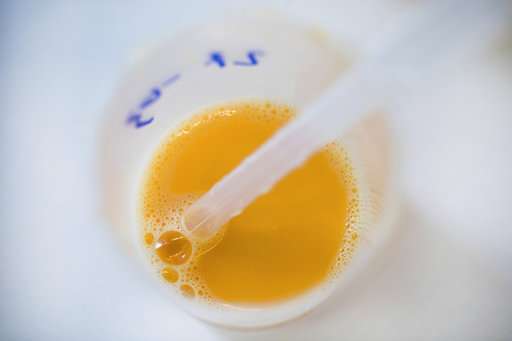Dutch arrest 2 suspects in investigation into tainted eggs

Dutch investigators on Thursday detained two men suspected of being involved in the illegal use of pesticide at poultry farms that sparked a food safety scare in several European countries.
The detentions and a series of coordinated raids in the Netherlands and Belgium marked another escalation in a widening scandal that has seen eggs tainted with the pesticide Fipronil stripped from shelves in countries including the Netherlands, Belgium and Germany.
Food safety authorities in other countries, including Britain, have reported discovering eggs from farms where Fipronil was used or products containing eggs from those farms.
It's believed that the insecticide got into the food chain when it was illegally added to a product used to treat poultry for lice, fleas and ticks.
Though no one has been reported as falling sick, prosecutors said in a statement that there is evidence that public health has been threatened by "the delivery or application of the biocide Fipronil in poultry houses in the egg sector."
The Dutch investigation, they added, is focusing on a Dutch company that allegedly applied the Fipronil, the presumed Belgian supplier and a Dutch trader who worked together with the supplier.
Dutch farms produce billions of eggs each year, the majority for the export market. An estimated 5 billion eggs are sold each year to Germany alone, according to a poultry farming union in the Netherlands.

Dozens of Dutch farms visited by the company suspected of using Fipronil have been temporarily banned from selling their eggs until the hens and their stalls are declared cleared of the pesticide.
During Thursday's raids, which were coordinated with European Union police agency Europol, investigators seized documents, bank account details and also automobiles and real estate.
Crime "may not pay," prosecutors said.
Britain's Food Standards Agency also said Thursday that the number of eggs that reached the United Kingdom from farms implicated in the Fipronil scare is much higher than previously thought.
The agency said the number is "closer to 700,000 than the 21,000 we previously believed had been imported." It published a list of 11 recalled products in which the eggs can be found, but played down the risks.
"While in some European countries eggs containing Fipronil residues have been sold as fresh eggs, in the U.K. this is not the case," the agency said in a statement. "Many of the eggs involved were mixed with other eggs which have not come from affected farms so Fipronil residues will be highly diluted."
© 2017 The Associated Press. All rights reserved.

















